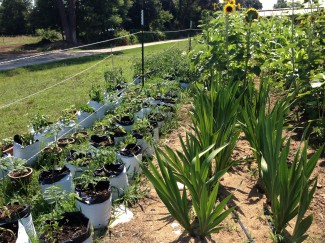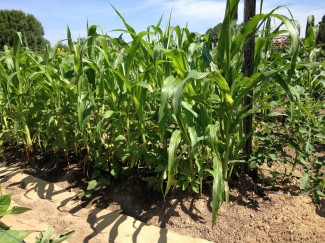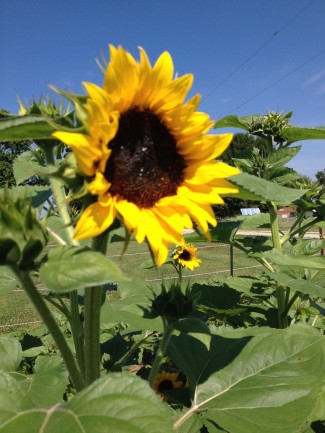Andy Downs grew up with farming as a lifestyle. Though he’s gardened throughout his adult life, he has now returned to farming through the Incubator Farm Program at the IFFS Teaching Farm. Andy named his Incubator plot, “Ida’s Garden and Gladiolus” in honor of his mother, who gardened and created flower arrangements for local weddings, churches, and events. Though an amateur florist, Andy says she was quite good, and the Gladiolus flower was always the foundation of her arrangements. Andy’s parents were small dairy farmers, and he and his 9 siblings worked the farm as kids, helping to raise vegetables as well. He learned how to grow vegetables from his mother, as Andy puts it “whether I wanted to or not.”
“I grew up in a time and place where having a garden like this was just a matter of course.”
That place was just outside of Nunda, a small town near the Allegheny Indian Reservation in western New York. Though they did not live on the reservation, his family is of Iroquois Nation heritage.
They grew enough food to feed the whole family, and, “what we didn’t eat, we canned, preserved, pickled, sold at a roadside stand, or sold door to door.”
Andy continued with the family dairy farm operation until his mid-20s, then, as he put it “made a living behind a desk, like most people do.” Now medically retired due to a diagnosis of Multiple Myeloma, a chronic blood plasma cancer, he has picked up farming again.
“I do this now because it’s what I enjoy, and because I like to grow things for myself and for others.”
Helping Other Farmers Learn
When Andy and his wife moved to North Carolina, he initially worked helping out a small farmer on the other side of Durham, but it was too far for him to drive from Raleigh consistently. Then he visited the IFFS Teaching Farm on Carolina Farm Stewardship Association’s Eastern Triangle Farm Tour, and realized it fit exactly what he wanted in a place to grow:
- A place to farm where he could grow some of his own crops
- A place where the food would be used in a good way
- A place where he could help other people.
He likes helping the other incubator farmers and sharing his previous farming and gardening experience with them. He finds affiliation with IFFS’s mission as well.
Long-term, Andy is hoping for find a partner farmer for “Ida’s Garden and Gladiolus,” someone who is just beginning to farm who he can help get started and who can continue the farm with Andy’s knowledge as guidance.
While he says he doesn’t hold any allusions about changing the foodshed with his small plot, he does think that the small farm movement is wonderful and philosophically believes it is important to society at one level or another.
Andy grew up using sustainable methods because, “that was what you did,” although he says what is considered sustainable has changed somewhat since then. He now avoids using any petroleum-based products (though the cause of Multiple Myeloma is unknown, some studies have shown increased rates among farmers and others exposed to agricultural chemicals and environmental toxins. All produce at the IFFS Teaching Farm is grown chemical-free). Andy uses recycled materials as much as possible as well, including for potted plants.

He’s always grown tomatoes and peppers in patio pots for himself, and he always thought it would be fun to sell the potted plants to other people, so they can have “honest-to-God fresh tomatoes that taste like real honest-to-God fresh tomatoes” right outside their door. He is currently growing tomatoes both in the ground in his plot and in pots for this purpose. He’s cultivating some interesting varieties, too – yellow pear and purple ball tomatoes. Look for them at the farm stand later this summer!
What else is he growing?
Everything in his plot at the Teaching Farm, “is about growing UP.” He utilizes techniques of higher-intensity farming to grow as much as his can in a small space, such as multi-cropping.
One example is the “three sisters method” of growing corn, beans, and squash together. However, what Andy thinks of as the “three sisters” tradition is a bit different than how it is typically grown here. Though grown in the summer, when Andy’s extended family would grow crops this way, he says, “it was all about the fall crops.” It was about growing food to sustain people through the winter. They grew corn to grind up into masa flour and beans to shell and save instead of growing snap beans to be eaten soon after harvesting. In Ida’s Garden, however, Andy is growing what’s traditional here – sweet corn and snap beans, modifying to suit the market.
The three vegetables are grown together because they each provide a benefit for each other. The beans provide needed nitrogen for the corn. The squash provides shade for the soil to retain moisture and prevent weeds, and the corn provides a stalk for the beans to grow up. As Andy says,
“It’s all about the inter-connection between the plants – and everything else – the ultimate sustainability.”
 Sunflowers also grow in Ida’s Garden and Gladiolus. Andy grows them in memory of his grandfather, who took pride every single year in attempting to grow a sunflower so tall that he (a very tall man) would not be able to read the head of it with a rake.
Sunflowers also grow in Ida’s Garden and Gladiolus. Andy grows them in memory of his grandfather, who took pride every single year in attempting to grow a sunflower so tall that he (a very tall man) would not be able to read the head of it with a rake.
Earlier this spring, Andy had sugar snaps peas and spinach growing, but he plans to till those now finished crops under soon to make way for okra and other late summer crops. He’s looking forward to lots of cabbage in the fall, too. Andy says he loves cabbage, slaw, and sauerkraut. He pointed out the current absence of cucumbers in his plot because he won’t grow anything he won’t eat.
For that reason as well, he won’t be growing a green called “New Zealand Spinach” again. His grandmother, who lived with Andy for much of his childhood, and from whom he learned as much about gardening from as he did from from his mom, grew the green and credited her good health to eating lots of it. Not a true spinach, it’s the closest thing to it that would grow year-round in the more northern climate. Andy, however, thinks it tastes terrible, so it’s not one he’ll choose to plant again next year.
His swiss chard is popular with the goats on the farm – who went straight for it when they escaped the other week.
You can find produce from ‘Ida’s Garden and Gladiolus” at the farm stand (open Thursdays & Fridays 12-6pm and Saturdays 9-1pm). After offsetting expenses and supporting IFFS all profits from Ida's Garden go to the Leukemia & Lymphoma Society to help other blood cancer survivors and fund research for treatment and a cure.
Follow Ida’s Garden and Gladiolus on Twitter, and for Andy’s own musings on farming, running, and life, check out chasingeverysunrise.org.
